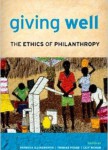Giving Well: The Ethics of Philanthropy

|
Title | Giving Well: The Ethics of Philanthropy |
| Author | Patricia Illingworth, Thomas Pogge, and Leif Wenar | |
| Reviewer | Nicholas Capaldi | |
| Review Date | November 01, 2013 | |
| Publisher | Oxford University Press | |
| Year | 2011 | |
| Rate this Book |
During the past few years, I have taught a course on the ethics of philanthropy. In that course, I have outlined two opposing world views, identified as Lockean and Rousseauean, and encouraged students to examine how one would establish and operate a charitable foundation or organization under each of those worldviews.
The Lockean Liberty narrative endorses the technological project, the transformation of nature for human betterment; identifies a free-market economy as the best way to carry out the project (à la Adam Smith, private property releases the imaginative ability of as many people as possible); argues that a free-market economy requires limited government (limited to providing the legal machinery to protect negative rights, enforce contracts, and dispute resolution), and wherein liberty is understood as restraining government on behalf of individuals’ private interests; maintains that the rule of law is focused on restraining government power by its emphasis on due process and the recognition that economic planning is incompatible with the rule of law (Hayek); advocates a culture of personal autonomy within which individuals pursue happiness and are not overruled by a collectivist good. Equality in this narrative means equality of opportunity and equality before the law; economic inequality is inevitable but unproblematic in a growth economy wherein “a rising tide raises all boats.”
The Rousseau/Marx equality narrative poses an alternative set of values. It largely rejects the technological project (extreme environmentalists still do), although Marxists and socialists later accepted it. Both ‘Rousseaueans’ and ‘Marxists’ attribute all social problems to the market economy that accompanies the technological project. The Lockean worldview is seen as illegitimate because it institutionalized inequality by letting everyone keep his/her original possessions in the first social contract. Instead, the Rousseauean narrative asserts that we must start over with a new dispensation in which the original position (e.g., Rawls) is a radical egalitarianism. Because in the Lockean narrative the rich and powerful are seen as imposing the original agreement on the weak, the economy must be heavily regulated to promote equality of outcome even in a global context. Rather than limited government we need a collectivist, all-encompassing good—a general will to which individuals are subordinated. Rousseaueans attribute positive rights to everyone, which means that you can have liberty only when the government provides you with the resources, through the redistribution of wealth, to achieve your goal. The legal system does not restrain government, but is the faithful servant of the general will. Each citizen subordinates his/her individual identity to the group in return for the achievement of happiness by serving the greater collective good. In place of the pursuit of happiness, all are promised the achievement of happiness through equality of outcome. Although there will be inequalities of function or status, somehow this will not cause resentment.
Much to my pedagogical delight, a book has recently been published that expresses the Rousseauean Equality narrative, namely, Giving Well. The book aims to answer the following questions: Who should give? How much? To whom? For which purposes? Why? How should the money be raised? How should charitable organizations spend the money they raise?
Philanthropy—the ‘love of humanity’—begins with the recognition of “the massive disparities of wealth between the affluent countries” and the other “half of humanity” suffering from “unfulfilled human needs” (3). There is no serious discussion of how the disparity came about. The response urged by several of the contributors and two of the editors is the transfer of resources from the ‘haves’ to the ‘have-nots.’ In what is described as Peter Singer’s “journey to the foundations of morality” we are given “specific, action-guiding answers” (8). Specifically, the top 0.01% of U.S. taxpayers should, according to Singer, “give away a third of their annual income” all the way down to the top 10% who should give 10%. Extending these percentages world-wide would more than cover the amount needed to achieve the Millennium Development Goals as outlined by Jeffrey Sachs and a U.N. Task Force (see http://www.un.org/millenniumgoals/). As Singer puts it, “it was not until, in preparing this article, I calculated how much America’s top 10% of income earners actually make that I fully understood how easy it would be for the world’s rich to eliminate, or virtually eliminate, global poverty” (24). Readers, there you have it, the end of poverty!
Singer’s argument is endorsed by Elizabeth Ashford (teacher of philosophy). Ashford claims that “the right to subsistence is a basic human right that imposes positive as well as negative obligations” (29). In Patricia Illingworth’s essay, redistribution is to be achieved by changing the U.S. Tax code to allow deductions that go beyond the water’s edge policy and by allowing charitable deductions to non-itemizers.
There was one essay that initially seemed oddly out of place, namely, Jon Elster’s attack on egocentric givers who through self-deception give only because they get a “warm glow.” In retrospect Elster’s essay is an attack on any motive for giving that does not involve guilt. There seems to be little room here for the work of positive affections or social sympathies.
Thus far this collection tells us who should give—the haves; how much—see Singer; to whom—the world’s poor; for which purpose—equality; why—because the haves are responsible for the plight of the have-nots and should act on the guilt of their social position.
In response to Singer, it should be pointed out that three-quarters of the wealth of the so-called super-rich is invested and re-invested in various economic enterprises. What are the unintended economic, social, and political consequences of withdrawing all of that investment and transferring it to the so-called poor in other countries? There are, by the way, no economists represented in the anthology. I presume that the editors think that economic institutions at present merely represent historical accident and are easily remedied by changes in political and legal structures.
The political order that at least one of the editors has in mind is global. According to Thomas Pogge, “The persistence of severe poverty in many poor countries is partly the result of the design of the global institutional order that foreseeably [re]produces vastly more poverty than would be reasonably avoidable. Had the rich countries pursued a different path of globalization during the past 20 years, the problem of severe poverty would be a fraction of its current size. Insofar as we citizens of rich countries (through our governments) participate in, or profit from, the imposition of this unjust order, we are materially involved in most of the harm human beings are suffering worldwide” (65). Pogge rightly points out how NGOs work at cross purposes and in a counter-productive way. One suspects that this would allegedly be remedied in a global order designed by Pogge.
Now we have the answer to the questions of how money should be raised—presumably through taxation; and spent—presumably under the international direction of global citizens with the wisdom to make the correct trade-off decisions. If we only knew where to find such wisdom.
One suggestion would be to go to universities where worldly-wise academics could advise us. Much to my initial glee, the book concludes with an essay by Devesh Kapur on the lack of ethics among academics, especially those who pontificate about everyone else’s shortcomings. But once more my hopes were dashed. Kapur’s main targets are western academics who do not take academics from developing countries (e.g., Kapur himself) as seriously as they should, and Kapur objects to U.S. universities who choose to profit from their research as opposing to merely giving the intellectual property away without copyright and patent protection. Once more, the message is transfer resources and prestige from the haves to the have-nots.
One of the things I found disturbing in a collection edited by philosophers was the lack of conceptual clarity. For example, philanthropy is defined as the love of humanity—sounds great. But there was no attempt to distinguish among and between philanthropy, charity, non-profits, NGOs, religious organizations, tax-exempt organizations, etc. Nor was there any recognition of the different kinds of philanthropies (e.g, those engaged in medical research, those focused on the arts, those interested in identifying government corruption, etc). Nor was there any attempt to prioritize among these or justify why poverty reduction takes precedence or how much preference over other charitable objectives. In the end, this collection was less about ethics and more about politics. It is informed by a socio-economic agenda and its solutions almost always suggest or intimate new political structures. As such, this collection is valuable as an outstanding example of a Rousseau/Marx driven conception of philanthropy.
There was one thing that I truly found valuable in this collection. There are a number of essays by real-world practitioners, Leif Wenar in particular, that document the paradox of how counter-productive so much of international NGO work really is. Wenar himself remains neutral between atheists (Easterly) and believers (Sachs).
What frightens me about so much of this literature, and some of the comments of my students when posed with this assignment, is a phenomenon that I have only recently come to recognize (although I admit that at a deep level I do not understand it). The phenomenon is the attitude that we must do something even when we know it is counter-productive because it is important to show that we care.
Nicholas Capaldi is the Legendre-Soule Distinguished Chair in Business Ethics & Director of the Center for Spiritual Capital at Loyola University, New Orleans, and a contributing editor to Conversations on Philanthropy.



